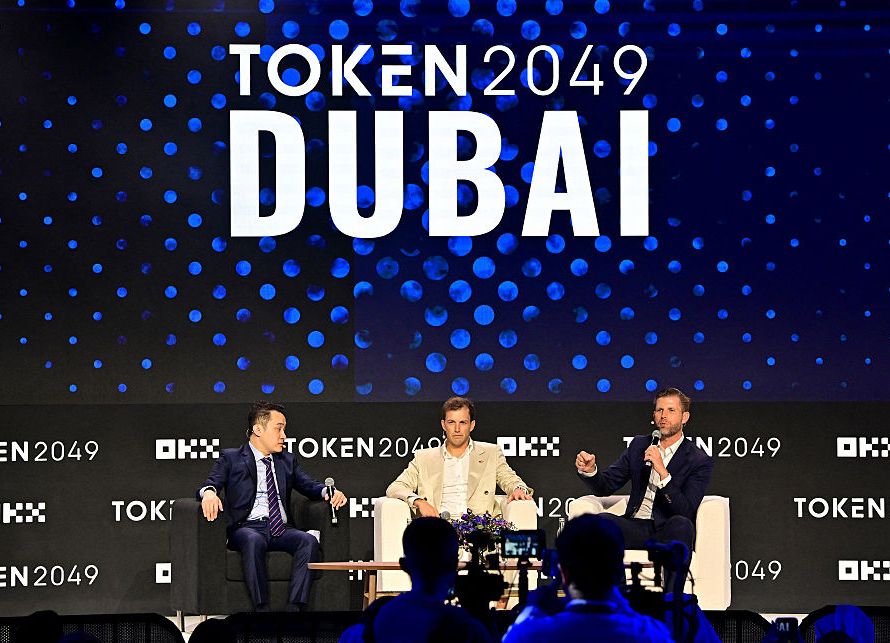As the leaders of World Liberty Financial, a crypto company part-owned by US president Donald Trump and his family, fan out across the globe to try to win new business, critics have raised the alarm over the collection of alleged conflicts of interest trailing in their wake.
On Thursday, Eric Trump appeared onstage in Dubai at the crypto conference Token2049. Alongside him sat Zachary Witkoff, cofounder of World Liberty Financial and son of the White House envoy to the Middle East, Steve Witkoff.
Together, the pair announced that USD1, a crypto coin unveiled by World Liberty Financial in March, would be used by MGX, an investment firm funded by the United Arab Emirates, to make a $2 billion investment in Binance, the world’s largest crypto exchange.
As a sort-of intermediary in the deal, World Liberty Financial stands to earn tens of millions of dollars. “We thank MGX and Binance for their trust in us,” Witkoff told the crowd at Token2049, The New York Times reported. “It’s only the beginning.”
USD1 is what’s known in industry circles as a stablecoin, a type of crypto coin tied to a $1 valuation by a reserve of cash and other assets. A stablecoin holds a steady valuation by way of the understanding that, if ever somebody wants to redeem a coin for the dollar it represents, the issuer can draw from the reserve.
The model is simple: World Liberty Financial receives US dollars in exchange for coins that customers can trade freely in the crypto market. It keeps some of those dollars in cash and cash-equivalents, and invests the rest into US government bonds—also called Treasuries—which yield interest.
The profits of stablecoin issuers depend partly on the going interest rate—right now, short-term Treasuries yield a little over 4 percent—but otherwise scale in a linear fashion with supply. The larger the amount of a stablecoin in circulation, the heftier the underlying reserve of assets from which the issuer can generate income.
Therefore, the deal between MGX and Binance, which will increase the USD1 supply by up to 2 billion units, stands to be immensely lucrative for World Liberty Financial—and by extension, Trump and his family. If the company were to invest the entire $2 billion in short-term US Treasuries, it would earn approximately $85 million in interest each year at current market rates.
However, the deal has inflamed concerns about the prospect that World Liberty Financial, in which the Trump family holds a 60 percent stake through a separate entity, could become embroiled in a thicket of conflicts and thorny ethical issues. By transacting in USD1, the argument goes, entities affiliated with foreign powers could indirectly transfer wealth to the Trump family and purchase good favor with the sitting US president.
“The transaction reeks of influence peddling,” claims George Selgin, director emeritus for the Center for Monetary and Financial Alternatives at the Cato Institute, a US think tank. It risks “making the US look more and more like a banana republic.”
USD1 is the latest in an expanding line of crypto coins issued by Trump-related entities that critics fear could theoretically be used in this way, including a separate World Liberty Financial coin that promises a say in the company’s business decisions, and a memecoin launched by the president in January.
“It is foreign policy for sale and justice for sale,” claims Robert Weissman, copresident of consumer rights non-profit Public Citizen.
World Liberty Financial did not respond immediately to a request for comment. In a statement, White House deputy press secretary Anna Kelly said, “President Trump’s assets are in a trust managed by his children. There are no conflicts of interest.”
Meanwhile, as World Liberty Financial forges into the stablecoin business, a piece of legislation that will establish the rules by which stablecoin issuers must abide —the GENIUS Act—is being fast tracked in the Senate. A parallel bill—the STABLE act—is being considered by the House.
The incoming stablecoin legislation “will make it easier for the president and his family to line their own pockets,” claimed Democratic senator Elizabeth Warren in a statement.
The conflict of interest allegations have not prevented representatives of World Liberty Financial from setting out on a global business tour. In recent visits to Pakistan, Bulgaria, and the UAE, the Trump family and World Liberty Financial founders have rubbed shoulders with lobbying groups, policymakers, and crypto industry luminaries.
“The stablecoin wars are in full swing, and new entrants are lining up with dotcom-era exuberance,” says Christian Catalini, founder at MIT Cryptoeconomics Lab. “Expect inventive maneuvers. Anyone chasing [the market leaders] will pull every lever the rulebook vaguely permits.”
On April 27, the World Liberty Financial team was pictured alongside Changpeng Zhao, founder of Binance, who recently served a short prison sentence in the US after pleading guilty to failing to maintain an effective anti-money-laundering program. The USD1 stablecoin floats on top of Binance’s crypto network. “We keep building,” Zhao tweeted, responding to the picture.
On Thursday at Token2049, Eric Trump and Witkoff shared the stage with Justin Sun, creator of crypto network TRON, who recently announced he had invested a total of $75 million in World Liberty Financial’s first crypto coin. Soon, USD1 will be available on TRON too.
In 2023, the US Securities and Exchange Commission charged Sun with market manipulation, among other violations. Weeks after Sun announced his latest investment into World Liberty Financial, a federal judge granted a petition by the SEC to pause the lawsuit to consider a potential resolution.
“Never before in American history have foreign governments, as well as people and corporations under investigation, so overtly and directly funneled vast sums to the president of the United States and his family,” claims Weissman. “This is far more than is captured by the term ‘conflict of interest.’”




